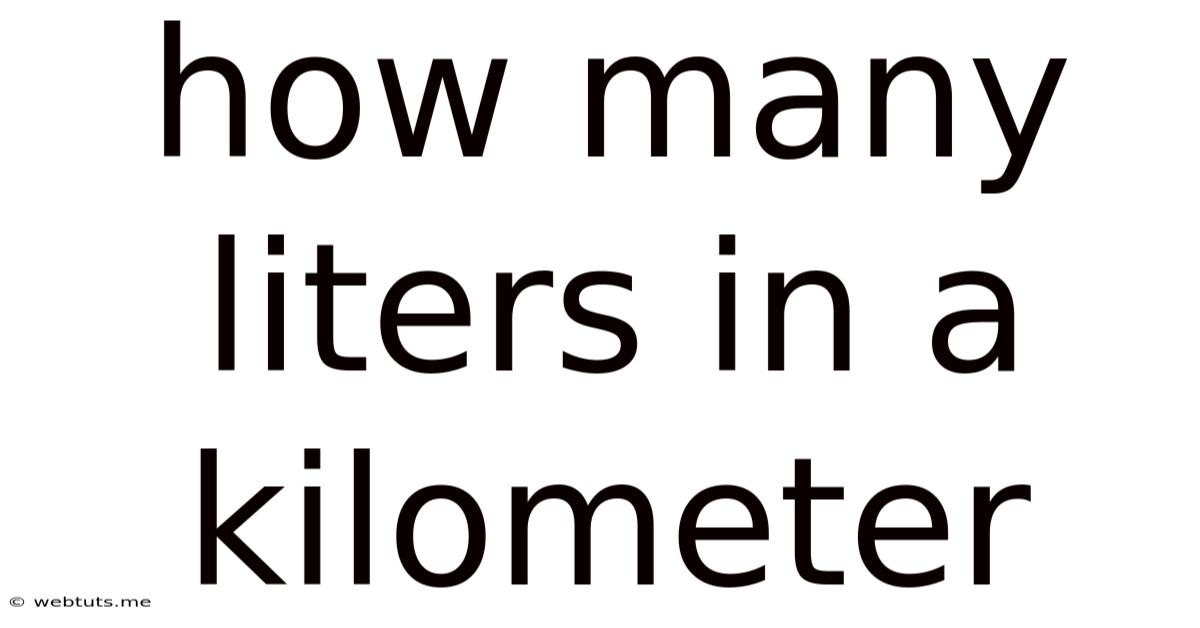How Many Liters In A Kilometer
Webtuts
May 13, 2025 · 4 min read

Table of Contents
How Many Liters in a Kilometer? Understanding Fuel Efficiency
The question "How many liters in a kilometer?" doesn't have a single, straightforward answer. It's a question that delves into the complex relationship between fuel consumption and distance traveled, a concept often expressed as fuel efficiency or fuel economy. This isn't a simple conversion like liters to gallons; it depends entirely on several crucial factors. Let's explore these factors and how they influence your vehicle's fuel consumption per kilometer.
Understanding Fuel Efficiency: Liters per Kilometer (L/km)
Fuel efficiency is typically measured in liters per 100 kilometers (L/100km) or kilometers per liter (km/L). While the question asks about liters per kilometer, L/100km is the more common metric, allowing for easier comparison across vehicles and driving conditions. To understand the relationship, remember that a lower L/100km figure indicates better fuel economy – you're using less fuel to travel 100 kilometers. Conversely, a higher km/L figure shows better fuel economy – you're able to travel more kilometers on a single liter of fuel.
Factors Affecting Fuel Consumption (Liters per Kilometer)
Several factors significantly impact how many liters your vehicle consumes per kilometer:
1. Vehicle Type and Size:
- Smaller Cars: Generally achieve higher fuel economy (lower L/100km) due to their lighter weight and smaller engines. They require less energy to move.
- Larger Cars/SUVs: Tend to have lower fuel economy (higher L/100km) because of their larger size, heavier weight, and often more powerful engines. This translates to greater fuel consumption to overcome inertia and maintain speed.
- Engine Size and Type: A smaller engine will typically offer better fuel economy than a larger one. Engine technology also plays a significant role; modern engines with features like direct injection and turbocharging can improve fuel efficiency even in larger vehicles.
2. Driving Style and Habits:
- Aggressive Acceleration and Braking: Frequent hard acceleration and sudden braking significantly increase fuel consumption. Smooth, gradual acceleration and braking conserve more fuel.
- Speed: Driving at higher speeds requires more energy, resulting in increased fuel consumption. Maintaining a consistent speed within the speed limit is crucial for optimal fuel economy.
- Idling: Leaving your engine idling unnecessarily wastes fuel. Turn off your engine if you're going to be stopped for more than a minute.
- Gear Selection (Manual Transmission): Driving in the appropriate gear for your speed helps optimize fuel efficiency. Higher gears at higher speeds are more fuel-efficient.
3. Road and Traffic Conditions:
- Road Type: Driving on uphill gradients requires more power and therefore increases fuel consumption. Conversely, driving downhill can improve fuel economy.
- Traffic Congestion: Stop-and-go traffic drastically reduces fuel efficiency due to constant acceleration and braking.
- Weather Conditions: Driving in adverse weather conditions, such as heavy rain, snow, or strong winds, increases fuel consumption due to increased resistance.
4. Vehicle Maintenance:
- Tire Pressure: Properly inflated tires reduce rolling resistance, leading to improved fuel economy. Underinflated tires increase fuel consumption significantly.
- Engine Tune-Up: Regular maintenance, including engine tune-ups, ensures optimal engine performance and contributes to better fuel efficiency.
- Aerodynamics: The vehicle's aerodynamics play a role. A more aerodynamic shape reduces air resistance, leading to better fuel economy.
Calculating Fuel Consumption: From Liters to Kilometers
To calculate your vehicle's fuel consumption in liters per 100 kilometers (L/100km), you'll need to know:
- The amount of fuel used (in liters): This can be determined by filling up your tank completely, driving a certain distance, and then refilling to see how many liters it took.
- The distance traveled (in kilometers): Use your odometer to track this.
The formula is:
(Liters of fuel used / Distance traveled in kilometers) * 100 = L/100km
Example:
If you used 50 liters of fuel to travel 500 kilometers, your fuel consumption would be:
(50 liters / 500 km) * 100 = 10 L/100km
This means your car consumes 10 liters of fuel for every 100 kilometers driven.
Improving Fuel Efficiency: Practical Tips
Several practical strategies can significantly improve your vehicle's fuel economy:
- Drive Smoothly: Avoid aggressive acceleration and braking.
- Maintain a Consistent Speed: Stick to the speed limit whenever possible.
- Plan Your Route: Avoid unnecessary stops and traffic congestion.
- Use Cruise Control: On long highway drives, cruise control can help maintain a consistent speed.
- Keep Your Tires Properly Inflated: Check your tire pressure regularly and inflate them to the recommended pressure.
- Regular Vehicle Maintenance: Schedule regular maintenance checks to ensure everything is running smoothly.
- Reduce Unnecessary Weight: Remove any unnecessary items from your vehicle to reduce its overall weight.
- Consider Eco-Driving Techniques: Learn and practice eco-driving techniques to optimize fuel consumption.
Conclusion: Understanding the Variables
The question "How many liters in a kilometer?" highlights the complexity of fuel efficiency. There's no single answer because fuel consumption varies greatly depending on various interacting factors. Understanding these factors and adopting fuel-efficient driving habits can significantly reduce your fuel costs and minimize your environmental impact. By consistently monitoring your fuel consumption and applying the tips discussed, you can optimize your vehicle's performance and achieve better fuel economy. Remember that focusing on L/100km provides a clearer and more standardized measure for comparison and tracking your vehicle's fuel efficiency over time.
Latest Posts
Latest Posts
-
How Many Pounds Is 120 Ounces
May 13, 2025
-
3 Hours And 40 Minutes From Now
May 13, 2025
-
How Many Tons Are In 3000 Pounds
May 13, 2025
-
1000 Sq Km To Sq Miles
May 13, 2025
-
How Many Pints Is Two Litres
May 13, 2025
Related Post
Thank you for visiting our website which covers about How Many Liters In A Kilometer . We hope the information provided has been useful to you. Feel free to contact us if you have any questions or need further assistance. See you next time and don't miss to bookmark.